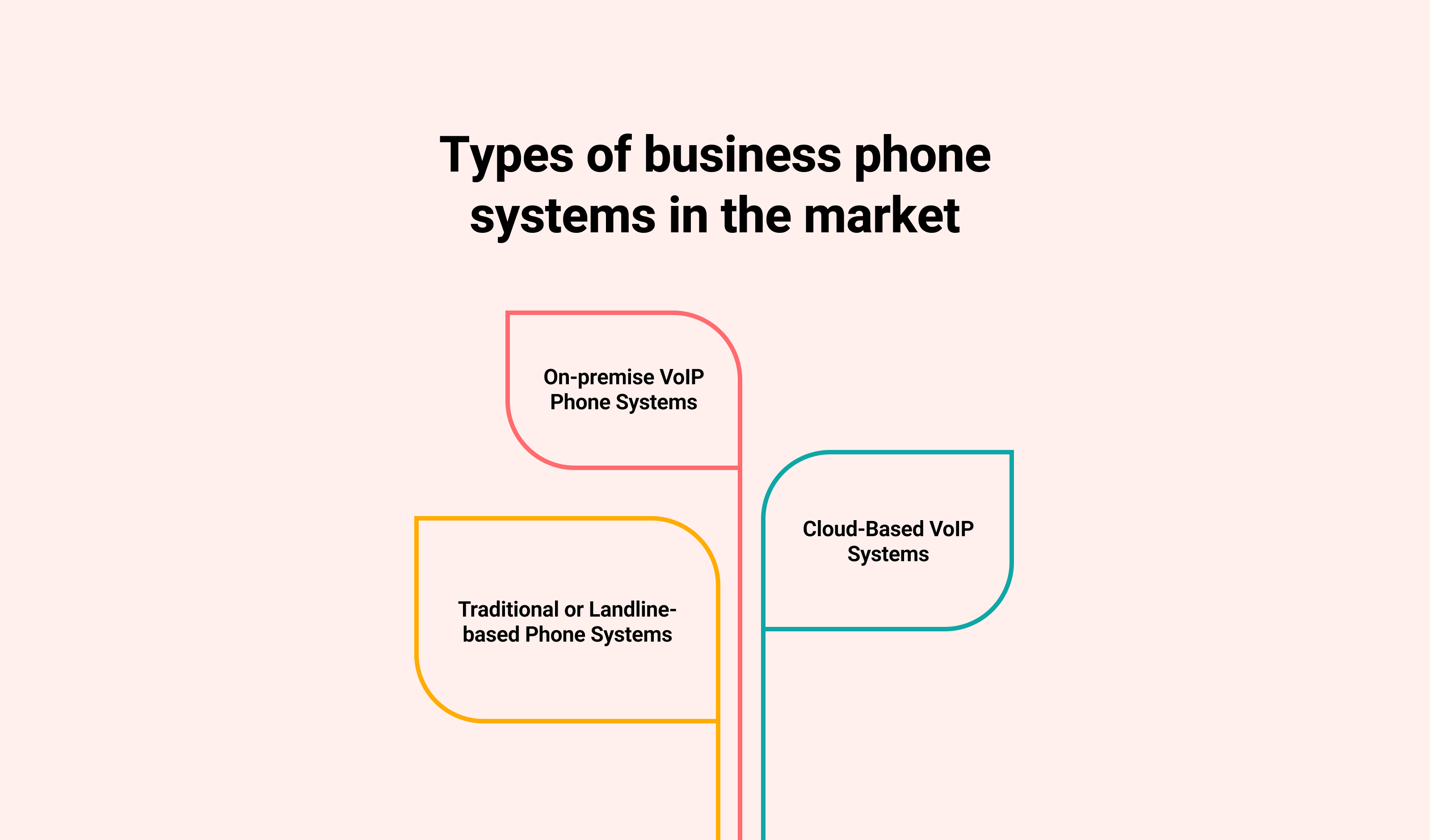Business Phone Systems are communication platforms that allow businesses to make and receive customer calls. Every business should have a communication system to engage its customers seamlessly. If you are one such business looking to invest in a business phone system, this blog is for you. Let us discuss its types and seven factors to consider before buying one.
Types of Business Phone Systems in the Market

Traditional or Landline-based Phone Systems
Traditional or Landline-based systems are business phone systems that come with basic features and enable businesses to handle customer calls. They are PSTN-based networks that transfer analog signals through copper wires to manage customer calls. They require huge upfront costs and need staffing help for installation, maintenance, and upgrades.
On-premise VoIP Phone Systems
VoIP refers to Voice over Internet Protocol. On-premise VoIP phone systems require a physical infrastructure and use the Internet to handle customer calls. They come with equipment such as PBX servers, VoIP phones, cables, wires, etc., that are maintained and hosted by the company on the premises itself.
Cloud-Based VoIP Systems
Cloud-based VoIP Phone Systems are communication systems in which calls are handled over the Internet. They come with many features and are cost-effective compared to the former ones. Since they are handled over the cloud, they do not require any investment in physical infrastructure and other equipment.
7 Things You Should Be Looking For When Buying A Business Phone System:
Cost
Initially, it is crucial to consider the budget when looking to buy a business phone system. The type of phone system that you use will also vary based on the budget. If you are a small or medium-sized business with minimal investment, cloud-based phone systems are a perfect choice since they don’t require hefty pricing. There won’t be any additional costs for maintenance, installation, or upgrades. You may go with a monthly or annual subscription plan based on your budget, and no more charges will be charged. Traditional landline or on-premise phone systems are super expensive as they require infrastructure setup, equipment, etc.
Setup
Setup is the next important factor that you should take notice of. The setup, hosting, and equipment requirements will vary based on the type of phone system. If you consider traditional or on-premise phone systems, a separate IT team or other agents will be required to perform the setup process, and it will take some time to get started. The same will be applicable in the case of upgradation and maintenance. On the other hand, with cloud phone systems, the setup a Business Phone System will take a few minutes and does not require anyone’s help as they are simple.
Flexibility
Flexibility refers to the means of adapting to new trends, technologies, or business market demands. In a cloud-based business phone system, adding new phone lines, adding or removing users, adding or removing virtual phone numbers, extensions, features, etc, is super easy and quick without worrying about upgrading hardware or software. This can be a beneficial option for small and medium businesses which have just started off. In traditional and on-premise business phone systems are considered less flexible as adding/removing phone lines, users, numbers, etc, is a huge process and will require ample time.
Scalability
Scalability refers to the ability to adapt to change or growth in the business. This is an extremely important feature, particularly for small businesses. Cloud phone systems allow businesses and their agents to operate from anywhere globally, benefiting remote workers. The other two systems require businesses to function from a physical location. They also come with a unified communication interface where multiple applications are integrated into a single platform. Hence, agents don’t need to switch between different applications when engaging customers. This increases customer satisfaction and the productivity of the agents. Traditional landline and on-premise phone systems lack scalability.
Features and Functionalities
Undoubtedly, you should not forget to explore the features and functionalities of business phone systems. Virtual business phone systems come with advanced features such as Auto Attendant, Multi-level Interactive Voice Response (IVR), Advanced Call Distribution (ACD), Call Barging, Call Whispering, Call Analytics, Call Recording, Call Forwarding, Call Queuing, Call Blocking, Call Transfering, Call Conferencing, Voicemail, setting up business hours, Hold music, Click to Call, etc. Traditional and on-premise business phone systems come with limited features such as call transfer, caller ID, voicemail, etc.
User Training Modules and Support
When choosing a business phone system, it is essential to note the level of customer support and user training. Proper user training is crucial to effectively maximizing any solution’s benefits. Make sure your business phone system provider offers a training module. This will help you to familiarize and train your staff and employees with the new business phone system. Also, by conducting a few training and workshops, agents can get a real-time experience with the new phone system.
Security
The security factor is undeniably essential to consider. Hence, check for security and compliance that will help you protect sensitive data, business reputations, and operations from potential threats. You can initially analyze and learn how different business phone systems handle data security. When buying a business phone system, you can check for data encryption methods, data backup and recovery approaches, multi-factor authentication, etc. Most cloud-based phone system providers follow strict security protocols with data to prevent potential attacks.
Conclusion
When choosing a phone system for your business, ensure you consider the above seven things and buy one that completely fits your requirements and budget. In addition to buying a business phone system, it is also important to check for a solution provider who specializes in offering the services. In this case, you can also consider the reviews and ratings before investing.





















